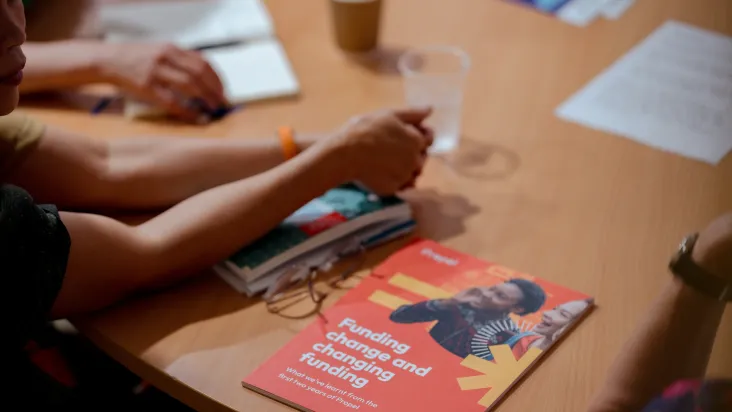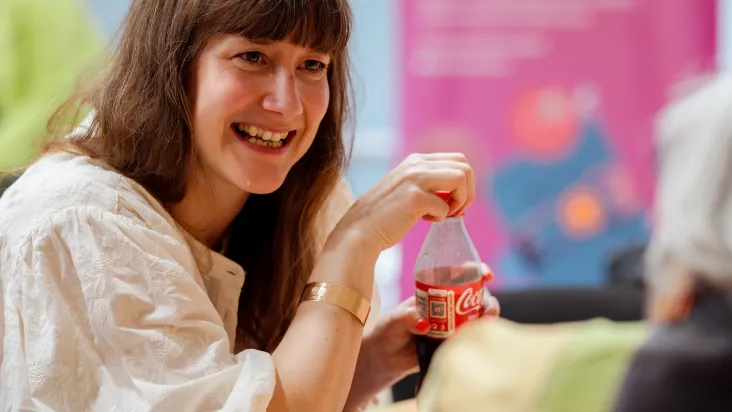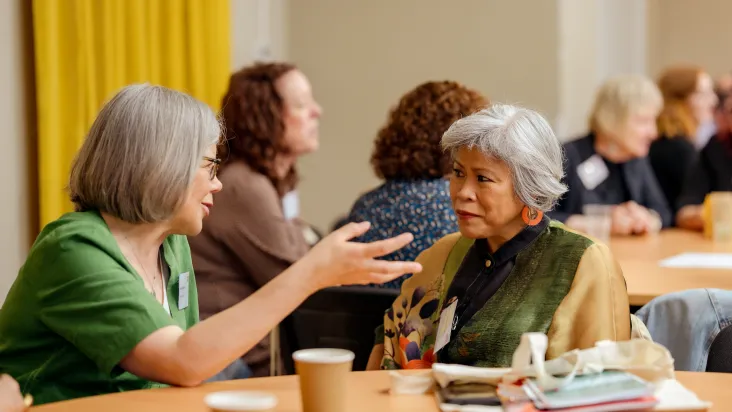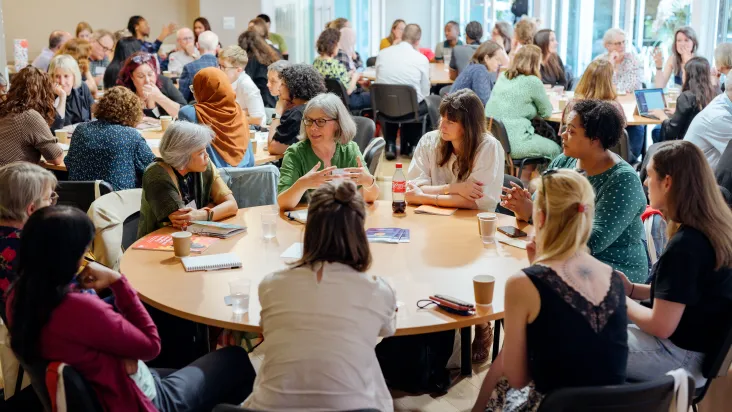Across these conversations, several questions were explored: how can funders shift from supporting isolated interventions to enabling long-term, systemic transformation? What does it take to fund not just activity, but connectivity, imagination, and the conditions for change? And how do we do this at a time when public systems are stretched, civil society is under pressure, and funding cycles often work against the very change we’re trying to support?
This summary surfaces the questions, tensions, and insights that funders and friends shared with us during the Festival. It invites reflection on how we see systems, how we share power, and how we might act in solidarity with communities to sustain change over time.
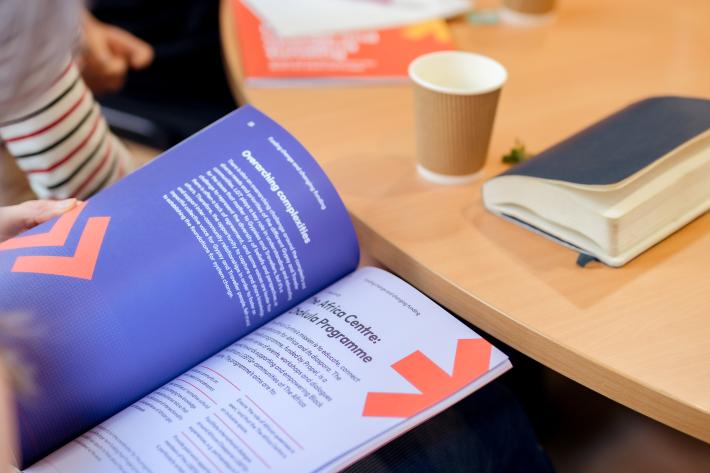
Systems change starts with relationships, not just strategy
Across all sessions, one message came through clearly: systems change work is at its core relational. It’s not just about redesigning services or policies - it’s about how people work together, how trust is built, and how power is shared. It invites us to work together in a different way: slower, deeper, more imaginatively and sometimes riskier.
At the session with Cripplegate Foundation, we heard about their five-year systems change programme focused on tackling domestic abuse, and how long-term, place-based collaboration can shift not just what organisations do, but how they do it. By creating space for dialogue, listening, and co-creation, the partnership enabled survivors of domestic abuse, statutory agencies, and voluntary organisations to work together in new ways. It meant that the support was designed from the perspective of those experiencing domestic abuse, not the public services that deliver the support.
As one survivor put it: “It hasn’t been professionals leading and survivors following. It’s been everyone learning from each other side by side. There's been space for disagreement and growth and reflection, and I think that's where the real magic has happened.”
In their session, Commonweal Housing shared how their long-term pilot projects are designed to give delivery partners ownership and autonomy, with funders acting as enablers rather than directors. Their approach centres on trust, flexibility, and a commitment to learning - even when things don’t go to plan.
"We want to give people the opportunity to try something that they might not have been able to do otherwise, and hence the evaluation is crucial because we want to share the learning, good or bad, from that particular project".
- Commonweal Housing
This kind of work takes time, consistency and a willingness to resist the urge to act quickly in favour of building something deeper.
Power needs to be shared (but that’s easier said than done)
The ability for funders to share their power is not just a ‘nice to have’ when working towards systems change, but essential.
At its core, systems change is about transforming the structures, relationships, and assumptions that hold problems in place. That transformation can’t happen if decision-making remains concentrated in the hands of a few. Sharing power between funders, charities, and communities is essential because it brings in the lived experience, local knowledge, and creativity needed to challenge and reimagine existing systems. The Giving Lab, a participatory funding model developed by The Social Innovation Partnership (TSIP), offers one example of how communities can lead funding decisions. But as several speakers noted, sharing power isn’t just about handing over control – it’s about building trust, staying accountable, and recognising the emotional labour of those directly affected by the system.
The Giving Lab, a participatory funding model developed by TSIP, shows how communities can lead funding decisions when given time, trust, and ownership. Over six years, the model was co-designed with local teams and embedded in community infrastructure, enabling over 60 grantees to shape not just what was funded, but how funding decisions were made. The process surfaced key lessons about the importance of locally rooted participation, the need to share power without absolving responsibility, and the risks of tokenism when participatory approaches aren’t sustained. It showed that when communities are trusted to lead, they can build stronger local networks, challenge traditional funding dynamics, and unlock new forms of systems change.
We heard that fear of relinquishing control can hold funders back. But we also heard that when power is shared well, it can lead to stronger partnerships, more relevant solutions, and a deeper sense of ownership.
"What does it mean to share or shift power without absolving yourself of responsibility?"
- The Social Innovation Partnership and Renaisi
Commonweal’s model of devolving decision-making to delivery partners, while providing strategic support and absorbing financial risk, was offered as one way to make power-sharing more practical and less performative. Their feasibility grants and long-term commitments give smaller or newer organisations the space to test ideas without fear of failure.
"Ultimately, it is their project. We enable them to do it. Key decisions sit with them"
- Commonweal Housing
Funding the conditions for change, not just the activity
A recurring theme was the need to fund not just what happens, but how it happens. That means investing in the conditions that enable systems change: time, trust, infrastructure, and imagination.
The Curiosity Society and Nationwide Foundation spoke about the importance of funding connectivity, reflection, and learning. They argued that systems change requires a shift in mindset - not just among grantees, but within funding organisations themselves.
"Systems change work changes who you are and what you do"
- The Curiosity Society
This also means being willing to fund work that doesn’t have clear outcomes yet. Cripplegate’s partnership deliberately avoided setting fixed goals at the outset, instead focusing on building a shared understanding and testing ideas over time.
The challenges of sustaining the work
One of the most pressing concerns raised was the sustainability of systems change work. Westway Trust and Renaisi described how short-term funding, staff turnover, and shrinking public sector capacity are making it harder to embed and sustain change.
We heard that many local systems no longer have the “absorptive capacity” to take on new initiatives. And when change isn’t sustained, the risks are real: broken trust, feelings of extraction, and a return to the status quo.
Funders were encouraged to think about how they can act in solidarity with communities, not just by funding projects, but by supporting the infrastructure, networks, and relationships that make change possible.
"There are huge risks if we work in a participatory way, and then things get pulled away"
- The Social Innovation Partnership and Renaisi
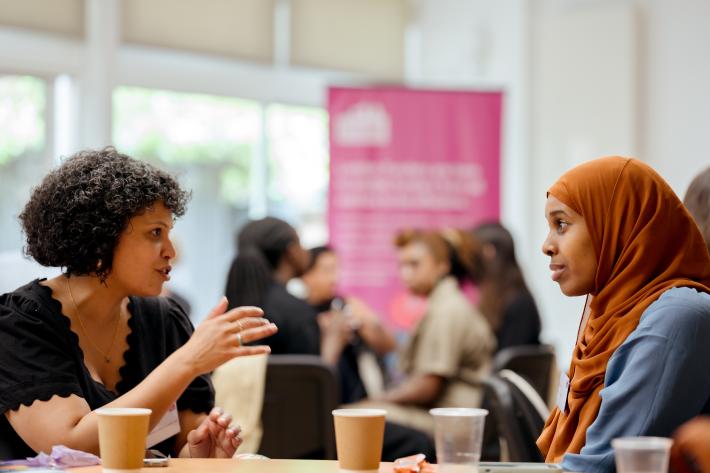
Looking ahead
Through these sessions hosted during the Festival, a set of shared questions, tensions, and insights emerged. They reminded us that systems change is slow, messy, and deeply human, and that funding it well means being brave, collaborative, and willing to learn. They also reminded us that working in this way can have transformative impacts – for a local area, a group of people or on a policy issue.
We’re grateful to everyone who shared their experiences and reflections. We look forward to continuing these conversations and to supporting funders to act in solidarity with communities for lasting, systemic change.
